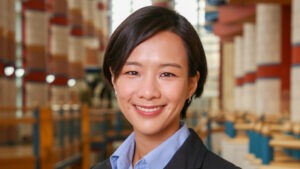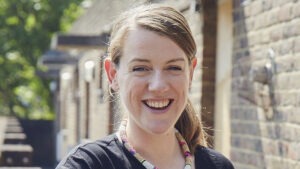Designed to work around your life
We offer 2 Executive MBA programmes; the Cambridge Executive MBA which is delivered over 16 weekends and 4 week-long blocks and the Global Executive MBA, delivered over week-long blocks (4 in Cambridge) as well as live online. Both programmes last for a total of 20 months, making them a feasible commitment for the busiest professionals. It is a demanding schedule, but the coursework involved is designed to complement your organisational responsibilities, as the programme encourages you to apply what you learn to your own role and organisation. The weekend format ensures that you can maintain a work-life balance and family responsibilities alongside your study schedule.
Explore the programme structure
Increase your influence
Hear our participants, alumni and faculty talk about their experiences on the Cambridge Executive MBA.
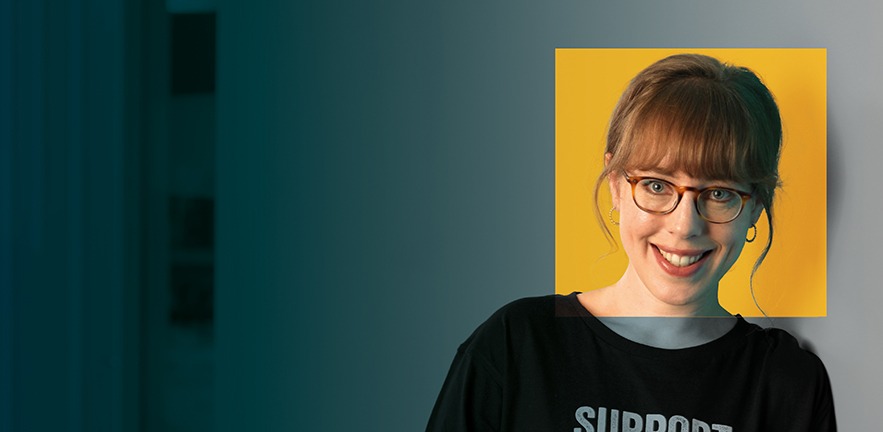
Intensive team-work meant I developed the relationships needed to turn ideas and partnership visions into reality.
Why study an Executive MBA at Cambridge?
Scholarships for women
The Executive MBA Scholarship for Women is awarded to two outstanding female candidates each year and will contribute 30 per cent towards the tuition fee. We also offer circumstances-based Executive MBA bursaries and industry sector-based scholarships. Recipients of the Scholarship for Women act as ambassadors for the Executive MBA, making positive contributions to the class and playing an active role in women’s leadership at the Business School.
View our fees and funding page
Access to an unparalleled network
The programme offers the opportunity for you to network with peers in your cohort and with the Cambridge Judge Business School community. You will also have access to the huge networking potential of the wider University: its students, academics and alumni. EMBA participants benefit from unparalleled opportunities to engage with and learn from innovators, entrepreneurs and business leaders who contribute to the programme as guest speakers, mentors and coaches.
Developing dynamic, diverse leaders
Cambridge Judge Business School is empowering the next generation of women leaders, strengthening the professional business and leadership skills needed in demanding and influential roles.
Each year, the Executive MBA welcomes women and men from all over the world. Representing diverse industries, professional roles, backgrounds and lifestyles, our participants become part of a brilliant network of professional connections and friendships.
Meet Executive MBA alumnae
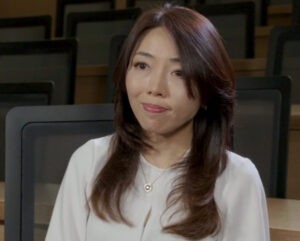
Preparation for a C-Suite role
Satoko Jenkins (EMBA 2015) talks about how the Executive MBA prepared her for a C-suite role.
My name is Satoko Jenkins. I am CFO of Capcom EMEA, which is an international computer video game company, and I graduated from Judge Business School in 2017. I started working for Disney as a corporate finance team member, which had an opportunity to learn about, back then, 17 different business units under Disney umbrella and understanding their activities, understanding their numbers, and how effectively we can just do the business.
Business and finance really is not all about numbers. So finance just sounds like very much an accounting or a punching in numbers and so on, but it’s just really not that. So I really wanted to become a senior finance person who can contribute into the corporate strategy to drive the business better. I became the first female director of Capcom EMEA business, and it is quite an honourable achievement for me.
The most exciting thing about my work is that I constantly and continuously define how the business creates values, and it’s because that the computer video game industry is fast-moving and changing all the time and with the rise of technology. So I definitely have to know inside and out of the business as well as industry to make strategic decisions. It’s quite dynamic, and it’s quite exciting.
The reasons why I really wanted to join the Judge for the MBA programme were I had quite a good business experiences by the time I applied for the MBA programme. However, I knew that all the decisions I made in those business case scenarios and I experienced were quite limited. And I learned a lot from that, but I knew that there are so many other things that I could apply and think about. I wanted to know that what other methods and approaches I could actually have and apply for on each business challenge scenario, which may come up in the future.
I have quite a good educational background in Japan, and my career development could be quite comfortable if I stayed in Japan. But I wanted to be globally competitive, and then I knew that I needed something more on my CV to be taken serious, to be taken more competitive candidate. Around the time I applied for the MBA programme, my back then line manager, who was the CFO of the company, told me that he is thinking to leave the company in a couple of years, and he wanted to make me as a successor. But he said that, you’re not ready yet, you have to understand what leadership really means.
I have only just a couple of years to step up to the new challenge. What can I do to make myself more competitive and good enough to be a CFO? That’s why I applied for this programme. I thought, I have to learn some sort of a manly leadership skill and style in two years, but it was so wrong. I could accept myself, and I could embrace my skills, and that was the beautiful thing from this programme that I could actually just learn from.
I was genuinely surprised with such a flexibility of the faculty. My classmates are amazing people. We don’t only just share those kind of business related topics, we share good laughs and we do silly things together. And also, I made a couple of very close real friends. And at work, true friendship is quite hard to make. Those couple people are my treasure really, and we inspire each other, we share a lot of our challenges and dilemma, and we help each other.
From my experiences with Judge Business School, I could enhance my confidence a lot by accepting who I am and embracing my characteristics and personalities. I don’t have to reject my caring and sympathetic, empathetic nature. It’s not a weakness if it comes with competence. Be open-minded. Cambridge provides you and offers you so much. A couple of my classmates gave birth to their sons and daughters during the programme. What the school has helped them with was quite amazing. They could arrange additional catch-up, and they could arrange a different year to move into if they needed to take time off.
So it was a wonderful, wonderful arrangement, and I never thought that MBA programme could care that much of those personal circumstances for especially women who are just going through very busy family development and career development, all sort of things, and still just then are going back to school and they’re doing the business and study at the same time. It was wonderful support, and that is a flexibility I am so impressed with.
Of course, coming back to school while working full-time was quite difficult in terms of time management. However, whatever we learn at school was completely applicable to what we do at work. So it was something that we could spontaneously simultaneously can learn and apply, learn and apply, or think back, how could we actually have done just from what we learned?
The Cambridge brand attracts top players, top business people from around the world, so the peer network is the best thing ever we could actually just take from this programme. Not only the classmates from the same year, having the common platform as Cambridge attendees and graduates, it just instantly gives you access to anyone in this vast network. I learned a lot about myself, who I am, what I am good at, what I am not good at, what I have to improve. It’s completely up to you what you do. What you learn from it is down to your mindset, so be open.
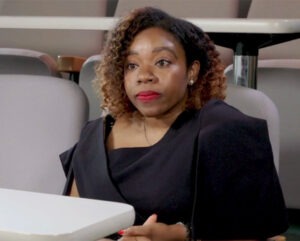
Approach to leadership
Shirley Okere (EMBA 2017) explains how the programme changed her approach to leadership.
My name is Shirley Okere. I currently work for Pfizer Biopharmaceuticals. I’m based in the UK. And what I do at Pfizer is I am the Director for Quality. And that’s supporting the quality operations function of the organisation. What excites me the most about what I do is the fact that I am supporting operations which enable valuable and required medicines to get to patients essentially.
So the role I do in supporting operations means that every activity that is required to get medication manufactured, checked, in the right state, is completed to the right standards. And that enables the patient to get a medicinal product that works for starters, that’s safe– and that’s the right products for them. Having spent some time growing up in West Africa, where my heritage lies, I was exposed to situations where perhaps there wasn’t the availability of good quality medication accessible to people across all classes. So I would say I was inspired by my environment. I was inspired by curiosity around how the medication works.
And I was inspired by wanting to do better and wanting to be part of being able to provide medication for people at large. As far as gender diversity goes and improving representation of women in executive leadership positions, I think there needs to be a holistic approach that looks at the pipeline– so looking at girls in schools being more engaged and interested in STEM subjects. And secondly, looking at a recruitment process, is showing that the recruitment process doesn’t necessarily have any inherent biases that might dissuade or might lead to women not being admitted into certain roles in the organisation.
And once the women are in the organisation, that the environment is conducive and takes into account nuances like women having to step back to start a family, for instance, making sure that when they do come back into the work-fold that the environment is conducive for them to continue to progress and they don’t stagnate. In the C-suite, for instance, if you do have a champion for gender diversity at that level– that that will encourage a discussion on how it aligns with business objectives and that will philtre through and ensure there’s enough resource that supports the agenda for gender diversity across organisation. And I think that that should be a more holistic approach. It’s not one solution– idea.
You probably need to start from the kind of grassroots level and work your way all the way to the top, ensuring the right support at each stage. I was at a point in my career where I felt I definitely wanted to further my education firstly. So it was a choice between something like an MBA, which is much broader in its remit, or a more focused– perhaps a science-focus– advanced degree. And after much deliberation, I settled on an MBA. And that was because I felt like, at that point in my career, I wanted a broader understanding of the organisation.
And I wanted to prepare myself for executive leadership positions. The Cambridge Executive MBA programme has definitely equipped me with a number of skills. It’s given me a tool box, so to speak, to approach leadership in a more holistic manner. Those new tools obviously, and those new skill sets, helped enhance the skills I came onto the course with and have really put me in a strong position in terms of understanding what the organisation requires of me in providing leadership and direction to the people that I am expected to lead.
And it does that, because in addition to the soft subjects like organisational behaviour, for instance, or leadership skills, it’s given me a greater amount of exposure and knowledge of the harder subjects like the finance and the accounting. So it enables me to connect the dots and have a more holistic approach to leadership. In terms of balancing life outside of the MBA with the demands and expectations of the course, I can understand how that can be a challenge. It’s 20 months off of hard work, and a lot of input is required from an academic mental perspective.
I do think the structure of the course helps to provide some balance. I found when I was applying for MBA programmes that the structure of the course, which allows us to be here at the Judge Business one week every month, helped me greatly in terms of maintaining balance between my work life and personal life and the actual studies. What’s important is to have structure and to ensure you ringfence some time to focus on the study. That will help strike balance, because the expectations in terms of that time are known to the people you need to spend time with. And it just enables you to make sure you set aside time for your life and your work as well.
What I found very useful about the way we were grouped on the programme was that firstly we where working as part of different groups throughout the programme. And secondly, within the groups, there was diversity in terms of the industries my fellow peers worked in. So that enabled us to learn from our peers, who had different perspectives on the same subject, and gain a broader perspective in so doing of that subject or topic. The lectures really prompted discussions with the different groups and the different kind of industry sectors on the same subject. So the dynamics of working in a group were that that, as part of a large cohort, was part of individual groups was quite unique, and actually facilitated the learning outcomes.
As a woman who has recently completed the MBA programme, I will advise any women considering taking the programme– it will help kind of confirm your existing abilities. It would also give you a broader perspective, which can be useful, especially considering a disparity in the corporate world as far as gender diversity goes. And it also just gives that added confidence for women in an environment, which perhaps might be male dominated, to progress, to apply for roles, and to have the confidence execute the current roles there in. So as a woman said to me and as one who has been through the course, my advice would be for any woman out there considering it to go for it.
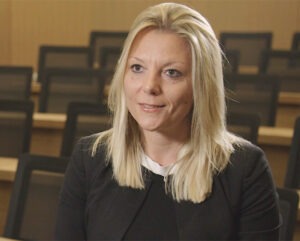
Launching a company
Cristina Savian (EMBA 2016) tells us how the Executive MBA prepared her to launch a company.
My name is Cristina Savian, and I’m the founder and managing director of BE-WISE. BE-WISE is London-based consultancy firms who specialise in bringing new innovation into the construction market. The construction industry is now facing huge challenges. We have a growing population. We need more housing. We need more infrastructure, and what we have needs to be refurbished and renovated. So with the also profit margin declining year over year, there is the only way to meet the demand is bring innovation into the construction market.
Well, I’ve been in the construction industry for now over 20 years. I started out when I qualified as a land surveyor that year back in 1998, and I actually did all my economics degrees while working full-time, mostly in the evening. I have a very technical background, and I’ve always been a techie. But also on the engineering side, there’s traffic engineers and driving digital innovation in the engineering field.
But when you accumulate so much knowledge and experience in a field, what tends to be missing is the soft skills in the management side. The more you move up into a career, the more you realise that, yes, it’s good to be very good at what you do, but you also need to learn more management skills, how you manage other people, how you motivate other people, how to lead teams.
I wanted to equip myself with the right tools to be one of the leaders in the construction industry. You certainly feel the weight on you when you study here. The day you graduate, in the same spot, has people like Charles Darwin and Newton. It’s empowering, but at the same time, it gives you a purpose. It gives a purpose that you are chosen to just do more with your life. You have the opportunity to change people’s lives with wider impact, and you can’t miss that opportunity.
I think what was fascinating is how quickly you can actually put into practise what you just learned in class. I think as a model, the fact that you’re working at the same time studying this part it’s extremely challenging, especially the massive time demand, is the fact that actually you can immediately test and learn.
And I think what is fascinating is most of the time, you actually don’t realise you’re putting it into practise. But then when you look back and a month later you meet with the rest of the class, you start discussing as you always do about what happened in the previous month. It’s fascinating how you actually realise a month before you would never have acted in that way. You never necessarily would have made a decision.
The most surprising benefits was definitely the friends that I made along the way. Those relationships I built in the last three years now are going to be relationships for the rest of my life. They are going to be people that are going to be part of my life, not just on the work site, working with me, advising me on a day-to-day basis, but they are people that are going to be around for a long time. You certainly build very, very, very strong relationships with most of the people in the class.
We can’t talk openly at work because we’re all competing with each other. But in this type of environment, you’re not competing. You are supporting each other in discovering the best version of yourself. Well, the Executive MBA was actually my third degree, academic degree, while working full time. So it was for most of it on the logistics side, I actually already knew how to organise myself.
Probably the challenging part is that I’m not 20 anymore. And you do need a lot more sleep than perhaps you needed when you were much younger. And also your reaction time and the amount of new learning that you can actually take, certainly it was a bit harder. So yeah, I could definitely feel a bit of the difference.
The course is manageable because otherwise, you wouldn’t have so many people going through. You just need to decide and certainly prioritise. So it is one of the other skills you learn when you have something so important to do during the course and so many tight deadlines to meet, something has to give. In fact, during the course, I decide to actually quit my corporate life working for a very large multinational company. And I actually decided to start my own company.
All my learning, not only from the MBA side, but, you know, my 20 year’s experience and shape my own future. And I really have to say thanks to all the rest of the class because without their support, without them telling me constantly what I was really good at, and what I was not very good at, I don’t think I would be where I am. They are the ones who really shaped my future and then probably they will keep doing for a long time.
Don’t be afraid of that taking that challenge. Don’t be afraid of learning more about yourself, learning how to be a more impactful leader, which will certainly help you in your personal life in being a mum. Don’t be afraid of taking this journey while you have young kids. I saw many of my classmates with very young kids too perfectly go through the programme. Yes, always comes with challenges. But we’re women. We’re bright.
A trailblazer in tech
Christine Chen (EMBA 2021) is a leader experienced in the tech sectors in Europe, Australia and Asia, ranging from defence, telecommunications, IoT and digital technologies across multinationals, startups and think-tanks.
Impacting the housing crisis
2020 Executive MBA, Katharine Hibbert’s social enterprise, Dot Dot Dot, turns empty spaces into affordable homes for volunteers. It employs 25 people and supports the charity sector with thousands of working hours.
Partners and family
Cambridge is an ideal location for couples and families with children. Small, with green spaces and beautiful architecture, Cambridge also offers a wide range of cultural, educational and leisure activities and is easily accessible from the rest of the UK and overseas. With a cosmopolitan population, schools in Cambridge welcome children from around the world. The University also runs 2 nurseries in the city for University members, close to the School.
Equality, diversity and inclusion
Cambridge Judge Business School aspires to become a leader in business excellence through Equality, Diversity and Inclusion (EDI) in everything we do. We expect our students to join us in our commitment for EDI to become a driving principle across the whole Business School.
Upcoming events
Join a virtual Q&A with our Executive MBA admissions team and ask everything you would like to know about the programme.
Join a virtual Q&A with our Executive MBA admissions team and ask everything you would like to know about the programme.
Join us in Cambridge for an in-person information session to learn more about the Cambridge Executive MBA.
Join us to learn more about the structure, benefits and outcomes of our Executive MBA programmes.


